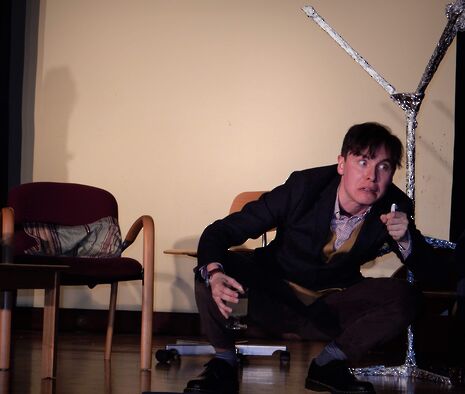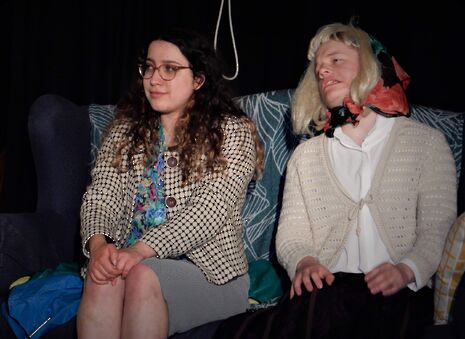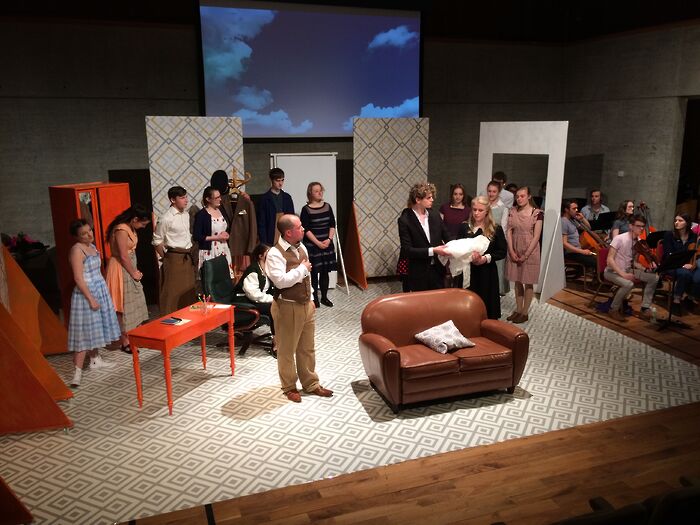Black Comedy review
A raucous slapstick comedy that fumbles a little in the dark

Black Comedy, an adaptation of the 1965 one-act farce by Peter Shaffer, is anything but dark. The show, performed by the Girton Amateur Dramatic Society, is named for its inverse lighting – it begins in complete darkness, and only when a power cut causes a blackout is the stage illuminated for the audience. As a result, we clearly see each fumble and misunderstanding in what is a fantastic device for dramatic irony. However, director Annabelle York avoids reliance on this gimmick through the creation of several hilarious characters and an escalating ludicrousness as they blindly fill the stage and butt heads (occasionally literally).
Set in a South Kensington flat, the scene opens on struggling artist Brindsley (Oscar Ings) and his fiancé Carol (Sophie Kean) as they prepare to welcome both Carol’s disapproving father, Colonel Melkett (Harry Camp), and famed German art collector Georg Bamberger (Annabelle York). Of course, on such an important night, everything would go wrong, including the unexpected return of boisterous neighbour Helen Gorringe (Isabella Yerassimou), a visit from the teetotal Miss Furnival (Pieter Durman), and the arrival of Brindsley’s former mistress Clea (Simrhan Khetani), all of which occur ‘in pitch darkness.’
"Durman's sudden drunken tirade about the plight of the middle class left me in tears of laughter"
Lighting design (Archie Breare) was expectedly very good. Whenever a match was struck, the lights would dim slightly, then suddenly flood back when blown out by the couple in an attempt to keep their guests in the metaphorical (and literal) dark. Similarly, the stage management (Alice Chapman), a critical element of this particular production, is very worthy of praise. The eclectic mix of furniture is densely-packed, allowing the couple and their guests to play well with the space, knocking tables and spilling glasses while manoeuvring the apartment. At times the physical comedy felt a little rough around the edges, most notably when Ings shattered a lamp on stage, though given the abundance of physical comedy, this may well have been intentional.
The energy of the cast varies, with Camp and Yerassimou being standouts for their consistent animation, but each character was comedic in their own right. Ings’ Brindley flits between fawning sycophancy and panicked fluster like a man whose life is falling apart around him. Kean perfectly captures the spoilt, dislikeable daddy’s girl stereotype, contrasting with Khetani’s sultry and irreverent ‘other woman’. Camp goose-steps around the stage with the pomp and self-importance of a fearsome in-law. Another highlight was Durman, whose sudden drunken tirade about the plight of the middle class left me in tears of laughter.

It would be wrong to say the characters gelled together, but therein lay much of the humour. Something would always catch my eye: at one point Yerassimou gave an impassioned speech (complete with wild gesturing), seemingly unaware of Ings juggling her stolen furniture behind her, in an attempt to cover-up the misdeed. When the jokes landed, they landed well. Even so, it would have been good to see the entire cast bring an over-the-top farcicality. Sometimes characters stood with a blank expression when they might have dramatically reacted to the events unfolding around them.
Sound design also felt a little like a missed opportunity; the only added effects I noticed were chirping crickets. The turntable in the corner of the room led me to believe music would play an important role, perhaps light background jazz to juxtapose the mayhem of the night. Crucially, this could have helped bridge the occasional awkward pause in conversation.
This is a promising performance, especially given the production was put together entirely by freshers. The show doesn’t take itself too seriously, and this occasionally comes through in the roughness of some elements, but it is nevertheless a romp, and a great way to laugh away the blues of exam term.
 News / University Council rescinds University Centre membership20 February 2026
News / University Council rescinds University Centre membership20 February 2026 News / Hundreds of Cambridge academics demand vote on fate of vet course20 February 2026
News / Hundreds of Cambridge academics demand vote on fate of vet course20 February 2026 News / Judge Business School advisor resigns over Epstein and Andrew links18 February 2026
News / Judge Business School advisor resigns over Epstein and Andrew links18 February 2026 News / Caius students fail to pass Pride flag proposal20 February 2026
News / Caius students fail to pass Pride flag proposal20 February 2026 News / Union cancels event with Sri Lankan politician after Tamil societies express ‘profound outrage’20 February 2026
News / Union cancels event with Sri Lankan politician after Tamil societies express ‘profound outrage’20 February 2026










